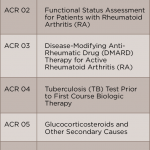
I cherish this opportunity to serve as the president of the American College of Rheumatology (ACR). It is both an honor and immense responsibility, because the ACR is the preeminent professional membership organization for rheumatologists in North America—if not the world. I am reminded that the ACR also welcomes members in a variety of membership categories, including research members, international fellows and members, fellows-in-training, residents and students.
In addition, the Association of Rheumatology Health Professionals (ARHP), a division of the ACR, is the home for the nonphysician workforce specializing in rheumatology, namely, registered and licensed practical nurses, nurse practitioners, physician assistants, physical therapists and occupational therapists, as well as practice managers. Although our diverse membership offers a challenge for planning and managing resources, it’s an advantage to be unified in an integrated organization with a single voice.
Who Am I?
I have been a faculty member in the Division of Rheumatology and Immunology at Duke University for nearly 30 years. I see patients two days a week and spend the rest of my time in research and administration. My research interests revolve around the investigation of new therapies for rheumatoid arthritis, vasculitis and Sjögren’s syndrome. I also work with the Immune Tolerance Network, a NIAID-sponsored consortium devoted to the discovery of tolerance-inducing therapies.
My background, thus, provides me with a good understanding of the challenges and opportunities facing our academic workforce. I am also keenly aware of the issues facing rheumatologists in practice. However, I will seek out advice to ensure we are not missing a beat on practice matters. Importantly, the Board of Directors, the Executive Committee and the 13 committees responsible for acting on behalf of the organization are strongly represented by practicing rheumatologists who will keep me abreast of the issues and provide direction for the ACR.
On the ACR Front
What is front and center on the ACR radar screen? The ACR is currently upgrading its technology infrastructure to enhance data integration and capabilities for delivery of products and services. I realize that many members, like me, have been unhappy with the ACR’s website. Next year, the ACR will unveil a new website that will be much easier to navigate for the purpose of efficiently accessing our diverse portfolio of resources.
The ACR is building a Learning Management System (LMS) that will provide relevant and value-added e-learning for our members, as well as an opportunity to expand the delivery of education to other audiences. A multiyear project, the new LMS platform will begin to take shape during my tenure.
Another major ACR initiative now being rolled out is the Rheumatology Informatics System for Effectiveness (RISE) Registry. The ACR is tackling the difficult task of building an electronically enabled registry for rheumatology. This project is fast becoming a reality as more and more practice sites connect through their EHRs to the RISE Registry and begin to assimilate and analyze data about their delivery of care.
In my view, these major ACR initiatives are critical to the future success of our organization.
Like many professional associations, the ACR must create value for our younger members. Many of us are products of the baby boomer generation, with its distinctive values. The younger generation is more tech focused, team oriented and committed to a work–life balance. They are also facing massive debts from college and medical school. The ACR is taking a hard look at how culture, science and technology are affecting our younger colleagues. Our first foray into this question was the 2020 Task Force, which in 2013, yielded an in-depth environmental assessment and a comprehensive set of recommendations to address the changing needs of the younger generation. Not surprisingly, the report showed that the demographics and behavior of our workforce are changing. Women comprise a growing proportion of the rheumatology workforce, and the proportion of physicians working part time is on the rise. The younger generation has a different work style, emphasizing the importance of getting the work done over the older generation’s obsession with structure. The ACR has an opportunity to embrace the younger generation and create experiences that will provide solutions to their unique and complex challenges.
Other ACR strategic priorities are no less important. The ACR remains heavily committed to the success of the ACR/ARHP Annual Meeting and our two journals, Arthritis & Rheumatology and Arthritis Care & Research, because they are considered to be survival functions of the College. The ACR recognizes the need to set the standards for quality of care in rheumatology by developing nationally accepted, scientifically rigorous disease criteria, treatment guidelines and quality measures relevant to practitioners.
Advocacy remains a key strategic focus of the ACR, with no shortage of issues to address at both the federal and state levels. The political action committee of the ACR, RheumPAC, has increased our influence with the federal government, but the wheels of government turn slowly and are lessons in patience.
The ACR is proactively facilitating the recruitment, training and retention of well-qualified rheumatology professionals and promoting research through our committees and the Rheumatology Research Foundation. The Foundation has seen unprecedented growth over the past decade and is now the largest private funding source of rheumatology research and training programs in the U.S.
Honoring the Past
I am deeply indebted to the three immediate past presidents of our organization, Drs. Jim O’Dell, Audrey Uknis and Joseph Flood. They led the Executive Committee during my three years of preparation for becoming president of the ACR. Each of these individuals is an outstanding role model and has set an example of remarkable organizational leadership and stewardship.
I am looking forward to hearing from all of you as we work together to advance rheumatology. The ACR is a strong and powerful force—a voice to be heard.

E. William St.Clair, MD, is president of the ACR and chief of the Duke Division of Rheumatology and Immunology. Dr. St.Clair, a rheumatologist, has 25 years of experience as a clinical investigator. Contact him at [email protected].
High-Priority Initiatives
- Information systems upgrade—superior data integration and delivery of products and services.
- ACR website re-architecture—clean and simple design, intuitive navigation and easy access to relevant content.
- RISE Registry—interoperability with multiple EHRs, benchmarking for quality and efficiency and improved quality of care.
- Learning management system—expanded online education adaptable to audience, needs and preferences.



